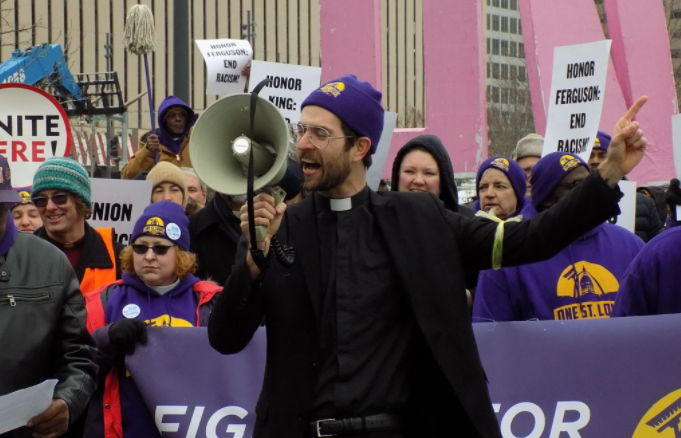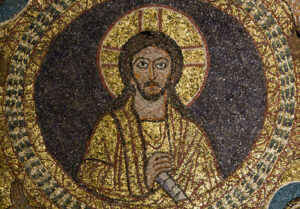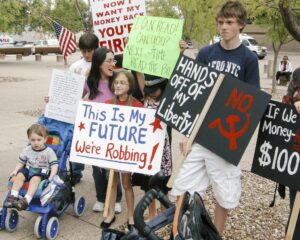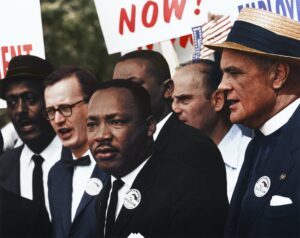In the online sphere of discourse—by which I mean Twitter—you can’t throw a rock without hitting a hot take about the so-called “religious left.” A little over a year ago, after a drawn-out Twitter dispute, an avalanche of articles, tweets, and podcasts attempted to say something definitive about the religious left. Yet it remains unclear just what the religious left is, or whether we need one. Distinguished religion reporters like Elizabeth Bruenig, Matthew Sitman, Kaya Oakes, Jack Jenkins, and Guthrie Graves-Fitzsimmons have made important interventions on this question. But mainstream punditry often fails to see that the religious left is much more complicated than national trends, voting blocks, and value polls.
These things may help us start to discern the shape of the religious left, but they provide little human depth or texture and are often abstract. The story of the religious left, and the Christian left, is just the stories of our own communities. We must attend to the particulars—the motivations, histories, denominational backgrounds, and local struggles—that drive religious people to radical action.
As a person who is “religious”—Christian, specifically—and on the “left,” I care about clearly defining what this political force is and how it works. This is, at least partly, my story to tell. At a moment when left-wing Christianity is becoming relevant again, I want to describe the movement as I’ve seen it on the ground in my own community of St Louis, introducing the people whose witness has been important to me. These individuals serve as examples of what Christian leftists, especially in the labor movement, lend to the visions and concrete strategies of broader leftist politics.
While many stereotype Midwest regions as “fly-over” country, in my experience even a medium-sized city like St Louis has an abundance of politically committed Christians who have shown up for striking workers where it matters. Catholics, Mennonites, Baptists, and Methodists, as well as people of other faith traditions like Jews, and Muslims have all participated in these local labor struggles. But, I’ll focus on the folks from my own community and from my own denomination, the Episcopalians.

It’s hard to know exactly where to pick up the story of Christian labor activists in St. Louis — much less Episcopalian ones. Any account will leave out important moments, ordinary people, and smaller struggles. Organized labor has a long history in St. Louis, and was home to the 1877 St Louis Commune, where workers briefly took control of the city after a general strike. One place to start is St Mark’s Episcopal Church. Constructed in 1939, the church features an unusual modernist window design, reviled by some for the radical story it tells in stained glass.
St Mark’s was the project of Missouri Diocese Bishop William Scarlett, who became radicalized during his time ministering among miners and railroad workers in Arizona in the early twentieth century. The stained glass conveys a blunt story that Scarlett thought modern churches should be concerned with: Jesus came to put an end to racial and class conflict — and you don’t want to be on the wrong side of that sword.
St Mark’s radical portrait of oppressed and oppressors casts a clear moral vision for the Episcopal Diocese of Missouri and there are several members who have faithfully carried out this vision in their own witness, work, and organizing. Here are their stories.
The Rev. Dr. Teresa Danieley
While many people think of Missouri as a deep red state, it sits between two very Democratic cities, Kansas City and St Louis, which means liberals can occasionally pass progressive legislation. In 2020, for example, Missourians overwhelmingly voted for statewide Medicaid expansion, which the state GOP fought to overturn.

Leading the charge against the St Louis GOP was the Rev. Dr. Teresa Danieley, an Episcopal priest and organizer with Jobs with Justice (JWJ), a national union rights organization. Dr. Danieley brought the fight to the GOP by organizing direct actions, testifying before legislators, and delivering messages directly to the governor in Jefferson City.
Dr. Danieley was raised an Episcopalian. She’s been a priest for 16 years and has spent 12 of those years in St Louis as a parish priest. But for the last three years, with the permission of the Bishop of Episcopal Diocese of Missouri, her primary ministry has been working with Missouri Jobs with Justice.
Her role with JWJ sets her apart as a priest in the local community. She’s built a platform to connect local religious communities with the ongoing fight for worker justice in the city. For example, she started a Labor in the Pulpits program that provided resources for faith communities to get more involved in local labor issues. She also built the Faith Labor Alliance, a coalition of labor and faith communities who build political power, organize together, and “name names.” Before the pandemic, the Faith Labor Alliance even hosted a monthly breakfast at the local bricklayers union hall.
Dr. Danieley has a grounded and straightforward way of connecting her faith and politics. “Anything that I believe politically, any policy that I support, any vote that I take, is rooted in my faith in Jesus Christ and my belief that the Church’s mission,” says Danieley. “My mission as a Christian and as a priest is to restore all people to unity with God and each other in Christ through prayer, worship, proclaiming the Gospel and promoting justice, peace, and love” This is a sentiment Danieley pulls directly from the Catechism in the Anglican Book of Common Prayer.
Dr. Danieley has thought deeply about how her politics and faith coalesce as a leader in healthcare and labor struggles. Rev. Danieley’s witnesses to the fact that, while the specific struggles healthcare or workers’ rights are important, there’s also a bigger spiritual vision at play.
Fr. John Stratton
In January of 2020, I moved to St Louis from a rural town in Southern Illinois. I had just started a job organizing with the Fight for $15 and, on my first day, I attended a rally organized by SEIU local 1 Janitors for higher wages. Fr. Jon Stratton, an Episcopal priest, grabbed the microphone and loudly announced that God was on the side of the oppressed, not the bosses withholding wages from janitors.
Later, I watched Fr. Stratton sit in the middle of the street in front of the Janitors’ employer’s building to block traffic and disrupt business. With other workers and community members, he was arrested and thrown in the back of a police van.

Fr. Stratton is the rector of Trinity Episcopal Church in St Louis, where he’s served for five years. Fr. Stratton was raised as a Pentecostal and became an Episcopalian during college. His political awakening came a bit later.
“On a weekday afternoon in downtown St Louis … while I was leading noonday prayer,” Fr. Stratton said, “I heard shouting and clanging out in the street. The shouting was coming from janitors from SEIU demanding a fair wage, and the clanging was coming from tin cans full of pennies. After prayer, I stepped outside and joined the demonstration, signed my name on a clipboard, and kept on showing up.”
Fr. Stratton has now become a mainstay in many of the activist and labor organizations in the city.
Fr. Stratton understands the important role that faith leaders can play in the streets. “Faith leaders are particularly well suited to speak to the moral implications of labor laws/policies,” he says, “and to use specifically religious language that resonates with folks on a deep spiritual level.” Clergy can provide energy and authorization, suggesting that it’s not just morally wrong for an employer not to pay enough or provide benefits, but spiritually wrong. It’s not just mad people in the streets; God is pissed off, too.
The Rev. Aaron Rogers
On May 20th, 2021, The Rev. Aaron Rogers, pastor of Trinity Episcopal Church in St Louis, told striking workers, gathered community members, and local McDonald’s franchise owners that “God cares that people can afford healthcare, feed their kids, have time off of work, and care of their communities.”
The day after the strike ended the Rev. Aaron Rogers, along with other clergy and community members, walked striking workers back on the job. Walk-backs are an important aspect of strikes, ensuring a smooth transition back to work.
Rogers was asked by the group he led to speak with their manager. “We’re just here to make sure you know that this worker was exercising her legal right to strike and is now returning to work,” he said. At that moment, the moral and spiritual power of the clergy’s role in labor organizing was clear.

Reflecting on the role of clergy in labor struggles, Rogers says “Faith leaders do tend to carry a moral weight with them. Either by the conviction of the words or by our odd uniforms (something about those collars just really stands out).”
Rogers continues, “I see my primary job as a faith leader as twofold. First to remind people that God desires justice and expects us to do justice. Secondly, I think clergy have the authority to point out publicly where we see God positioned. I can step up and say I see God with the workers, I see God fighting for the unemployed, I see God caring for the oppressed…and sometimes people listen.”
Rogers frames his witness and activism as a part of something bigger: “I think of strikes and labor activism as essential steps in moving toward a just society. For me personally, strikes and labor activism help move us toward the Beloved Community. This is a vision of a community where everyone is cared for where poverty and greed and bigotry don’t exist.” In other words, standing with striking workers and showing up for exploited communities is as much a spiritual discipline as a political one.
Showing Up
Clergy and the communities they represent have an important contribution to make to the labor movement and other activist communities. As these portraits of St Louis clergy make clear, their presence lends strength to the moral claims made by workers, adding spiritual vision to their struggles while also representating spiritual communities. On the strike line, the rhetoric of clergy can paint a vivid picture of the stakes of worker struggles: God is here with the workers, not their bosses.
Clergy are more than just people in a religious uniform, they are representatives of faith communities. Even if you don’t believe in God, each clergy member represents the tangible powers of the multitude of the faithful. Pastors and priests represent the real people who fill the pews that can lend powerful support to a labor dispute. But clergy aren’t enough: it’s paramount that all people of faith show up for workers in their own communities.
In the unfolding story of the Christian left, we can, like I’ve done here, sketch out the figures in our own communities who lead the way by setting an example of Christian action in the midst of labor disputes and struggles. The next step, however, is to make these extraordinary examples set by our clergy ordinary, making them part of our own liberative spiritual practices. There is a long history of Christians in the labor movement, a history that Christians can participate in now. In Matthew’s Gospel, Jesus makes a promise to his disciples, saying “where two or three gather in my name, there am I with them.” This isn’t just a promise for churches, but also of gatherings of people in struggle — the only catch is that we’ve all got to show up.
Matt Bernico is an independent researcher and journalist. He has a Ph.D. in Media Communication from the European Graduate School. His primary research interests are at the intersections of religion, politics, and technology. You can hear more of his work on religion on the podcast he cohosts, The Magnificast.




